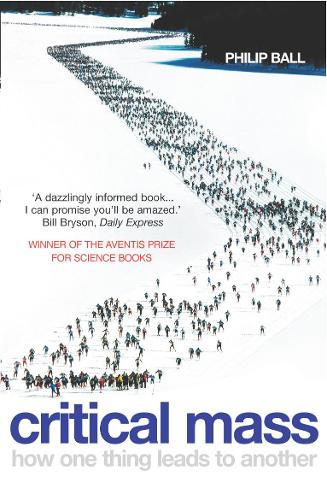
Critical Mass
(Paperback)
Publishing Details
Critical Mass
By (Author) Philip Ball
Cornerstone
Arrow Books Ltd
1st April 2005
3rd February 2005
United Kingdom
Classifications
General
Non Fiction
Philosophy of science
302
Winner of Aventis General Prize for Science Books 2005
Physical Properties
Paperback
656
Width 131mm, Height 198mm, Spine 40mm
448g
Description
Is there a 'physics of society' Ranging from Hobbes and Adam Smith to modern work on traffic flow and market trading, and across economics, sociology and psychology, Philip Ball shows how much we can understand of human behaviour when we cease to try to predict and analyse the behaviour of individuals and look to the impact of hundreds, thousands or millions of individual human decisions., whether in circumstances in which human beings co-operate or conflict, when their aggregate behaviour is constructive and when it is destructive. By perhaps Britain's leading young science writer, this is a deeply thought-provoking book, causing us to examine our own behaviour, whether in buying the new Harry Potter book, voting for a particular party or responding to the lures of advertisers.
Reviews
Exquisitely produced and painstakingly researched... Ball writes patiently and eloquently.. Exciting... A rousing call-to-arms, and an elegant answer to the shallow tradition of British empiricism. * Independent *
In his fascinating new book, Critical Mass, Philip Ball tells the story of this research in a comprehensive and often captivating way... Ball delves far beyond today's headlines... Impressively clear and breathtaking in scope... Substantial, impeccably researched and...persuasive. For anyone who would like to learn about the intellectual ferment at the surprising junction of physics and social science, Critical Mass is the place to start. * Nature *
Lucid, accessible and engaging... Ball makes a persuasive, comprehensive case and it's a welcome antidote to popular individualistic thought. * Glasgow Herald *
Critical Mass fizzes with ideas and insights * The Guardian *
more than a book, this in an intellectual curiosity * Independent on Sunday *
Author Bio
Philip Ball writes regularly in the scientific and popular media and worked for many years as an editor for physical sciences at Nature. His books cover a wide range of scientific and cultural phenomena, and include Critical Mass: How One Thing Leads To Another (winner of the 2005 Aventis Prize for Science Books), The Music Instinct, Unnatural: The Heretical Idea of Making People, Curiosity: How Science Became Interested in Everything and Serving The Reich: The Struggle for the Soul of Science Under Hitler.
